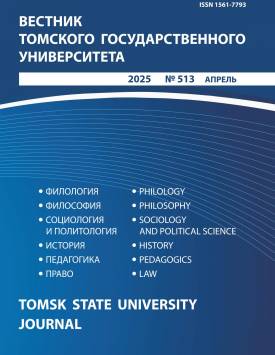The political agency of historiography: Consequences and context
The article proposes to understand the concept of historiography as a canon, despite the existing criticism of the use of this category in academic texts, and focus on the political aspects of historiography as a method of intellectual action and research optics, through understanding both the agency of historiographic models, which carries political consequences, and the analysis of the political context that influences the construction of historiographic models. This does not mean that historiography is a narrative about politics (the study of political history, etc.), but that it itself acts as a political phenomenon. The following political manifestations of historiographic models are noted: (1) the historical narrative itself, including that designed as a historiographic model, it can be interpreted politically, this also applies to projects of history depoliticization; (2) unlike historical knowledge, historiographic models preserve the linearity of the narrative; a consequence of this processual temporality is that any historiographic model has some goal, mission, connected with realization of interests of certain groups, which allows speaking about it, among other things, as a political project; (3) historiography performs a function of legitimation, as something that explains the past, defines the present and softens the impact of the past on it. Thus, the historiographic model can be interpreted as an authoritarian practice, reflecting interests of a certain community. Political agency of historiography also raises the question about the context of the canon, which functions through historiographic works, that is, it is necessary to consider what political conditions and in what way influence construction of certain historiographic models. The following factors seem to be determining: (1) the existence of a normative structure, within the framework of which different communities, interested in their vision of the past, evaluate themselves, implement their decisions and use ideas about history for their own purposes; (2) the established language of description is important, which is then transmitted through historiographic models, representing a resource associated with the interests of specific groups, and its transmission by other groups contributes to the strengthening of the influence of communities that speak the language; (3) the politicization of historiography is also strengthened by the context of post-normal science, which presupposes a temporary rejection of the search for truth as a traditional scientific ideal in the context of uncertainty of facts, values and the need to present a specific result. It is worth noting that the modern political reality is characterized by the action of several contexts simultaneously. The author declares no conflicts of interests.
Keywords
historiography,
historiographic models,
politics,
politicization of history,
canonAuthors
| Golovashina Oksana V. | Institute of Philosophy and Law of the Ural Branch of the Russian Academy of Sciences | ovgolovashina@mail.ru |
Всего: 1
References
Коновалова Н.А., Метель О.В. История идей против истории научных сообществ: две модели построения историографического исследования // Омский научный вестник. 2011. № 3 (98). С. 28-31.
Дворниченко А.Ю. Зеркала и химеры. О возникновении древнерусского государства. СПб.; М.: Евразия; Клио, 2014.
Степин В.С. Становление идеалов и норм постнеклассической науки // Проблемы методологии постнеклассической науки: сб. ст. / отв. ред. Е.А. Мамчур. М., 1992. С. 7-16.
Репина Л.П. Историческая наука на рубеже XX-XXI вв.: социальные теории и историографическая практика. М., 2011.
Baehr P. Founders, Classics, Canons. Modern Disputes Over the Origins and Appraisal of Sociology's Heritage. New Brunswick; London: Transactions Publishers, 2002.
Классика и классики в социальном и гуманитарном знании / под ред. И.М. Савельевой, А.В. Полетаева. М.: Новое литературное обозрение, 2009.
Блум Г. Западный канон. Книги и школа всех времен. М.: Новое литературное обозрение, 2017.
Уайт X. Метаистория: Историческое воображение в Европе XIX века / под ред. Е.Г. Трубинон, В.В. Харитонова. Екатеринбург: Изд-во Урал. ун-та, 2002.
Дастон Л., Галисон П. Объективность. М.: Новое литературное обозрение, 2018.
Latour B., Woolgar S. Laboratory Life: The Social Construction of Scientific Facts. London: Sage, 1979.
Pocock J.G.A. Historiography as a form of political thought // History of European Ideas. 2011. Vol. 37. P. 1-6.
Fasolt C. The Limits of History. Chicago: University of Chicago Press, 2004.
Аникин Д.А. Политика памяти в современном российском обществе: урбанистический аспект // Известия Саратовского университета. Новая серия. Серия Философия. Психология. Педагогика. 2011. Т. 11, № 1. С. 3-8.
The Postmodern History Reader / ed. by Jenkins K. Routledge, 1997.
Windschuttle K. A Critique of the Postmodern Turn in Western Historiography // Turning points in historiography: a cross-cultural perspective / ed. by Q. Edward Wang and Georg G. Iggers. P. 271-286.
Тесля A.A. В спорах о марксистской концепции русской истории: между автономией государства и НЭПом // Философия. Журнал Высшей школы экономики. 2022. Т. 6, № 1. С. 213-232.
Анкерсмит Ф.Р. История и тропология: взлет и падение метафоры. М.: Прогресс-Традиция, 2003.
Макклоски Д. Риторика экономической науки. М.: Изд-во Ин-та Гайдара, 2015.
Шапиро И. Бегство от реальности в гуманитарных науках. М.: Изд. дом ВШЭ, 2011.
Куиггин Дж. Зомби-экономика. Как мертвые идеи продолжают блуждать среди нас. М.: Изд. дом ВШЭ, 2016.
Пикетти Т. Капитал в XXI веке. М.: Ад Маргинем Пресс, 2016.
Reckwitz A. The Society of the Singularities. Cambridge; MA: Polity, 2020.
Райнерт Э.С. Как богатые страны стали богатыми, и почему бедные страны остаются бедными. М.: Изд. дом ВШЭ, 2011.
Мартьянов В.С., Руденко В.Н. Магия белого прогрессора: От глобального каргокульта к новой политической нормальности // Полития: Анализ. Хроника. Прогноз (Журнал политической философии и социологии политики). 2022. № 1 (104). С. 24-49.
Мартьянов В.С. В поисках другого мейнстрима // Полис. Политические исследования. 2021. № 4. С. 112-131.
Ван Дейк Т.А. Дискурс и власть: Репрезентация доминирования в языке и коммуникации. М.: УРСС: Книжный дом "ЛИБРОКОМ", 2015.
Funtowicz S., Ravetz J.R. Science for the Post-Normal Age // Futures. 1993. Vol. 25, № 7. P. 735-755.
Ravetz J. Science for a Proper Recovery: Post-Normal, not New Normal / Issues. 2020. URL: https://issues.org/post-normal-science-for-pandemic-recovery (дата обращения: 30.05.2021).
Порус B.H., Бажанов В. А. Постнормальная наука: между Сциллой неопределенности и Харибдой политизации знания // Философия. Журнал Высшей школах экономики. 2021. Т. 5, № 4. С. 15-33.
Lewanowicz C. Europe must remember its past to build its future // European Parliament. URL: https://www.europarl.europa.eu/news/en/press-room/20190917IPR61204/europe-must-remember-its-past-to-build-its-future (дата обращения: 21.02.2025).

